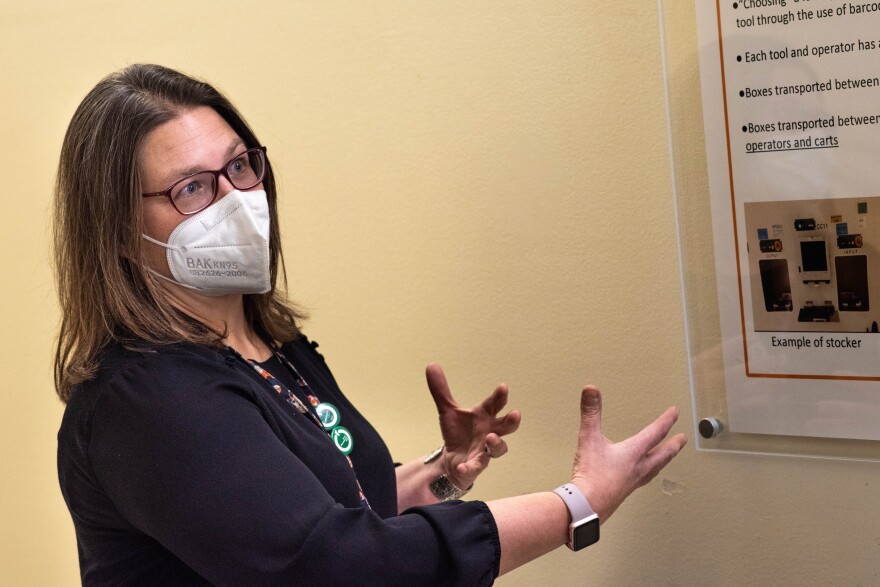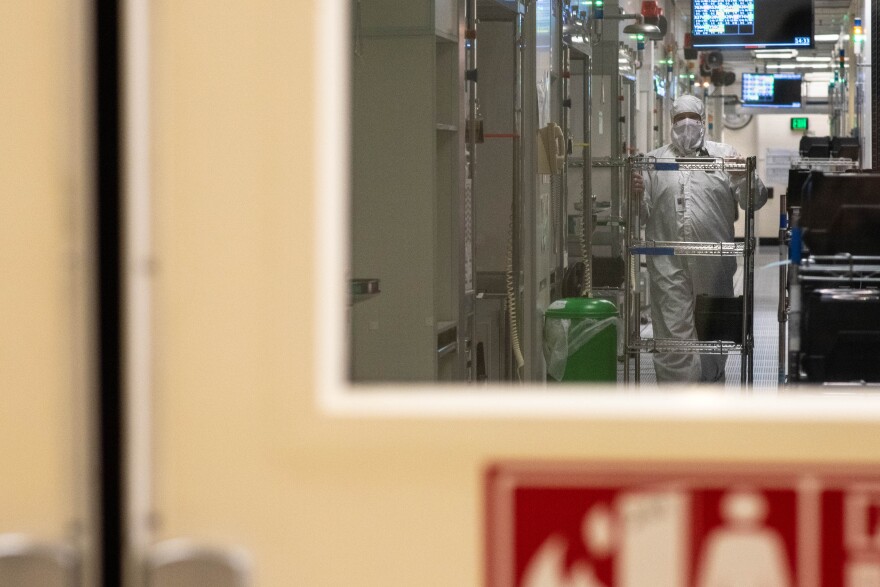The halls of GlobalFoundries’ sprawling campus in Essex Junction are quiet on a recent afternoon. At its peak, about 8,500 IBM employees worked here. Now, it has about 2,200 workers for GlobalFoundries. Even though the place doesn’t exactly feel bustling, there’s a high demand product being made within its walls: semiconductors.
Jennifer Robbins, the company’s director of productivity in Essex, peers through a window into what’s known as the fab, where the transistors, metals and wiring that make up computer chips are fabricated on 8-inch discs, known as wafers. The process is precise, Robbins says.

“If you were to pluck a piece of your hair, you'd need to divide it about 500 times,” Robbins says. “One piece of that would be equivalent to the size of a critical dimension of a transistor that we're making.”
Making an effective chip takes a while, according to plant general manager Ken McAvey.
“In order to make a semiconductor it takes anywhere from 90 to 120 days — a thousand different steps that all have to work perfectly,” McAvey says.
Once they’re finished and shipped, the chips made in the Essex plant, which the company calls “Fab 9,” go into phones, tablets, cars and other devices.

“Anytime you're sending and receiving information, it's most likely going through GlobalFoundries silicon,” says McAvey. “More specifically, most likely going through Fab 9. Over 85% of the cell phones in the world have content made from Fab 9.”
Though the facility feels relatively quiet, it’s fully booked and pumping out as many semiconductors as it can. That’s because the Essex Junction fab, and all others like it, are playing catch-up in a booming market.The chip shortage
“Demand just turned on almost instantly, and supply just wasn't there to meet it,” says Doug O’Laughlin, who writes a newsletter analyzing the semiconductor industry.
When the pandemic hit nearly two years ago, O’Laughlin says many companies — especially in the automotive industry — idled their plants and canceled semiconductor orders. Meanwhile, as people spent more time online for classes, meetings and entertainment, demand for digital devices and the chips that make them run skyrocketed. When car factories came back online, they faced a huge shortage of needed chips. So, O’Laughlin says, semiconductor companies like GlobalFoundries started pushing to add more supply.
“In fact, the most supply in probably half a decade has been added this last year, but it still isn't enough — it still is one step behind demand,” O’Laughlin says.
In Essex, the plant had seen years of workforce decline. But in 2021, the company says it hired 500 new Vermont workers to keep up with demand.
“We've seen our output grow over 20% year on year. We're completely sold out and running the factory at maximum utilization,” says McAvey. “That said, we are still growing.”
GlobalFoundries is primarily owned by an investment arm of the Abu Dhabi government. But it went public back in November, offering some of its shares on the Nasdaq exchange. Then, it signed deals to make chips for Ford and BMW. Both carmakers are hoping to avoid future supply chain constraints.Local importance
In Vermont, even after adding 500 workers, the company currently lists nearly 120 open positions on its website — significant numbers in this small state. And GlobalFoundries' impact goes beyond the 2,200 Vermonters it directly employs. The Essex plant and economic activity related to it support over 5,300 jobs and accounted for 1.6% of the state's gross domestic product in 2020, according to a report last year by the state economist.
Frank Cioffi, the president of the Greater Burlington Industrial Corporation, a nonprofit that focuses on local economic development, says the company is integral to the health of Vermont’s economy.
“The importance of the company here is absolutely incredible,” Cioffi says. “Where the industry is going today, in terms of the need for products, is just monumental.”

That monumental need has received a lot of attention from the Biden administration, which wants to see more semiconductor fabs built in the U.S. President Joe Biden celebrated the announcement of a new Intel chip fabearlier this month. The administration is also pushing for a bill that passed the Senate last year that would invest $52 billion in the domestic semiconductor industry.
But the touted Intel plant won’t open in Ohio for at least another three years. Meanwhile, older styles of chips, like the ones made in Essex, are in high demand. So older fabs like Essex are prized right now, according to analyst Doug O’Laughlin.
“Even just having the old equipment is becoming very valuable – not just the fab space, but the equipment. Anywhere globally, in the world, if you have a fab, it's more valuable than it was last year,” O’Laughlin says.Essex and Malta
Even as GlobalFoundries adds jobs in Vermont, it’s investing much more heavily in a plant just over the border in New York state. And that has some local leaders questioning the company’s long-term commitment to Vermont, and more specifically, Essex Junction.
“I'd say that this is absolutely one of the best places to live in, in the country,” says Andrew Brown, the president of Essex Junction’s Board of Trustees.
Standing just off the village’s main intersection, where new, multistory housing developments have cropped up in recent years, Brown says this dense community of over 10,000 residents has amenities that most small towns strive for: coffee shops, bars and restaurants, a full shopping plaza.

“Really, if you need something, you can get it here in Essex,” Brown says.
The economic vitality of this community can be traced back to the late 1950s, when IBM set up shop in town. At its peak, IBM’s computer chip manufacturing facility employed 8,500 Vermonters. But its headcount started to dwindle, and in 2015, the company paid GlobalFoundries $1.5 billion to take the plant off its hands.
More from VPR: GlobalFoundries Sets Up Shop In Essex Junction
That has not translated into a significant blow to the Essex economy. In fact, the town is growing, Brown says. But he adds, GlobalFoundries hasn’t invested enough in its operations here.
“Global Foundries and IBM before that had been investing in other facilities around the country and around the world, and have not been doing so here,” Brown says.
Global has invested $750 million in its Essex plant since taking over the facility in 2015, the company says. But compare that to what it’s doing elsewhere: doubling the capacity of its complex in Malta, New York, less than three hours away from Essex. It also moved its headquarters there last year, and invested $15 billion in the facility in the past decade, with another billion planned.
On top of that, the type of chips made in Essex are not the most advanced. Fab 9 specializes in analog radio frequency chips. Those aren’t the newest technology, but they’re in high demand, as is pretty much every kind of chip right now, says analyst Doug O’Laughlin.
“Even lagging edge chips are becoming really important in the automotive semiconductor shortage,” O’Laughlin says. “So all of a sudden, we went from chips are this extremely commoditized industrial good that no one even thinks about or cares about, to every country in the world is like, ‘We need a fab, domestically, now.’”

Despite increased demand, hiring and investment, not everyone is convinced Global is committed to Vermont. Andy Watts chairs the selectboard in Essex Town, which surrounds the village of Essex Junction. Watts was laid off from GlobalFoundries in 2019 after 38 years at the Essex fab, though he says the separation worked out well for him. He has doubts about whether the plant is in Global’s long-term strategic interest, pointing to the company’s sale of another fab in East Fishkill, New York back in 2019, which like Essex, was formerly owned by IBM.
“The fact that they've sold the Fishkill plant already gives a strong indication that they're not dedicated to Vermont at all — to former IBM assets,” Watts says. “They wanted the people, I think, more than the plant.”
Ken McAvey, the general manager of the Essex facility, has a different narrative. He says GlobalFoundries is absolutely committed to Vermont, and has what he calls “proof points.”
“The proof points in terms of record investment, the proof points in that the factory is growing, the proof point that we've hired 500 people in the last year. It can't be debated,” McAvey argues.
And GlobalFoundries appears to be taking interest in Vermont at a higher level: on Nov. 12, company CEO Tom Caulfield traveled to Montpelier and met with Gov. Phil Scott. According to Scott’s spokesperson, the company “communicated their commitment to Vermont and Vermonters.” Company leaders also spoke about another issue with the governor: how it gets electricity.
Power and money
Making semiconductors uses a lot of energy. The Essex plant consumes more electricity than the entire city of Burlington. Because it has the necessary infrastructure in place, the company wants permission to buy its own electricity directly from the grid, rather than from Green Mountain Power. McAvey says that would significantly reduce costs.
“Over half of our facility’s operating expense is driven by electricity. This is not competing around the world; this is just competing locally. Meaning 109 miles away, we have another facility that has electricity for essentially half the cost that we pay,” McAvey says, referring to Global’s headquarters in Malta.
GlobalFoundries has worked out a deal with GMP to separate from the utility, in exchange for several million dollars intended to soften the impact on ratepayers. That proposal is now before the state’s Public Utility Commission. It’s facing vocal opposition from environmental groups and some lawmakers, who argue the PUC doesn’t have the power to allow this move under current state law, and that GlobalFoundries is attempting to skirt state renewable energy regulations. The company disputes both those claims.

Another way Vermont can’t compete with New York? Money. Over the years, the Empire State has given GlobalFoundries subsidies worth well over $1 billion. As a much smaller state, Vermont has far less capacity to dole out corporate gifts. But that hasn’t stopped it from trying. When the Essex plant was sold to Global, the state of Vermont awarded the company $1 million through a short-lived program called the Vermont Enterprise Fund. It's also given the company over $500,000 in state grants to train workers at its site.
With those dynamics, Frank Cioffi says there’s always been concern about the plant’s future in his nearly three decades working in economic development.
“I think every year, there's been heartburn and trepidation about not only IBM, or GlobalFoundries, but any multinational corporation that's here that really makes a product or performs a service here that absolutely has little or no customers in Vermont or, you know, maybe even in New England,” Cioffi says.
Given where the semiconductor industry is right now, Cioffi and others doubt Global will up and leave Vermont anytime soon. If they do, Essex Junction board president Andrew Brown predicts another company could swoop in, take over the plant and keep making chips for phones and cars.
“Especially when we start talking about electric vehicles. And what those electric vehicles mean is the need for continued chips and the continued types of chips that this facility produces,” Brown says. “So I see that need being here for the foreseeable future.”
Whether or not it's GlobalFoundries, Brown says he expects someone will be making semiconductors in Essex for years to come.
Have questions, comments or tips? Send us a message or get in touch with reporter Henry Epp @TheHenryEpp.




